初中英语近义词辨析大全教学教材
- 格式:doc
- 大小:1.18 MB
- 文档页数:80
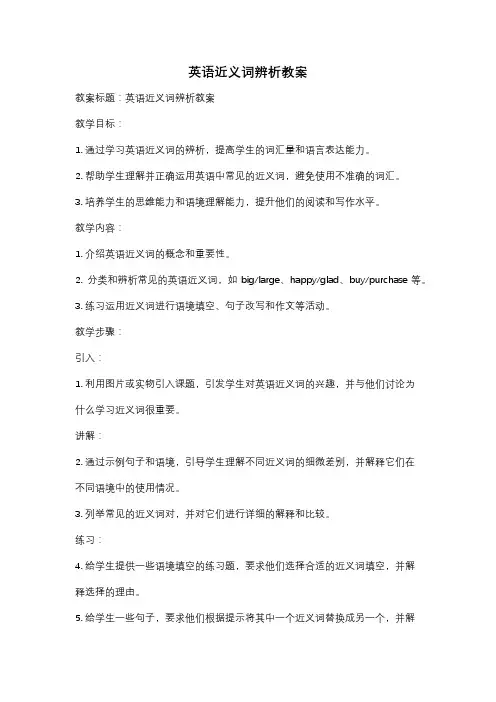
英语近义词辨析教案教案标题:英语近义词辨析教案教学目标:1. 通过学习英语近义词的辨析,提高学生的词汇量和语言表达能力。
2. 帮助学生理解并正确运用英语中常见的近义词,避免使用不准确的词汇。
3. 培养学生的思维能力和语境理解能力,提升他们的阅读和写作水平。
教学内容:1. 介绍英语近义词的概念和重要性。
2. 分类和辨析常见的英语近义词,如big/large、happy/glad、buy/purchase等。
3. 练习运用近义词进行语境填空、句子改写和作文等活动。
教学步骤:引入:1. 利用图片或实物引入课题,引发学生对英语近义词的兴趣,并与他们讨论为什么学习近义词很重要。
讲解:2. 通过示例句子和语境,引导学生理解不同近义词的细微差别,并解释它们在不同语境中的使用情况。
3. 列举常见的近义词对,并对它们进行详细的解释和比较。
练习:4. 给学生提供一些语境填空的练习题,要求他们选择合适的近义词填空,并解释选择的理由。
5. 给学生一些句子,要求他们根据提示将其中一个近义词替换成另一个,并解释替换的原因。
6. 分组让学生合作完成一篇短文,要求他们在文中正确使用近义词,并解释使用的理由。
总结:7. 让学生总结所学的英语近义词,强调它们的细微差别和正确运用的重要性。
8. 鼓励学生在日常学习和写作中积极运用所学的近义词。
拓展:9. 鼓励学生自主学习更多的英语近义词,并分享给同学们,扩大他们的词汇量。
评估:10. 给学生提供一份近义词辨析的小测验,检查他们对所学内容的掌握程度。
教学资源:1. 图片或实物2. 示例句子和语境3. 语境填空练习题4. 句子改写练习题5. 合作完成的短文任务6. 近义词辨析的小测验教学反思:1. 在讲解近义词时,要注意突出它们的细微差别,帮助学生更好地理解和运用。
2. 练习环节要注重培养学生的语境理解能力,让他们能够在实际语境中正确选择和运用近义词。
3. 评估部分可根据学生的实际情况进行调整,可以通过口头回答问题、写作或其他形式进行评估。
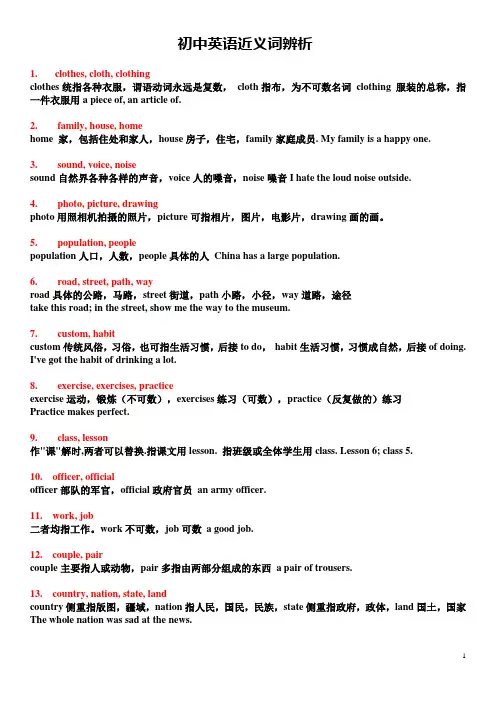
初中英语近义词辨析1. clothes, cloth, clothingclothes统指各种衣服,谓语动词永远是复数,cloth指布,为不可数名词clothing 服装的总称,指一件衣服用a piece of, an article of.2. family, house, homehome 家,包括住处和家人,house房子,住宅,family家庭成员. My family is a happy one.3. sound, voice, noisesound自然界各种各样的声音,voice人的嗓音,noise噪音I hate the loud noise outside.4. photo, picture, drawingphoto用照相机拍摄的照片,picture可指相片,图片,电影片,drawing画的画。
5. population, peoplepopulation人口,人数,people具体的人China has a large population.6. road, street, path, wayroad具体的公路,马路,street街道,path小路,小径,way道路,途径take this road; in the street, show me the way to the museum.7. custom, habitcustom传统风俗,习俗,也可指生活习惯,后接to do,habit生活习惯,习惯成自然,后接of doing. I've got the habit of drinking a lot.8. exercise, exercises, practiceexercise运动,锻炼(不可数),exercises练习(可数),practice(反复做的)练习Practice makes perfect.9. class, lesson作"课"解时,两者可以替换.指课文用lesson. 指班级或全体学生用class. Lesson 6; class 5.10. officer, officialofficer部队的军官,official政府官员an army officer.11. work, job二者均指工作。
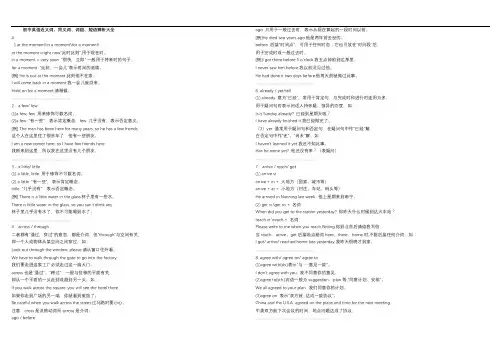
.初中英语近义词、同义词、词组、短语辨析大全A1.at the moment\in a moment\for a moment\at the moment=right now"此时此刻",用于现在时。
in a moment = very soon “很快,立即”,一般用于将来时的句子。
for a moment “此刻,一会儿”表示时间的延续。
[例] He is out at the moment.此刻他不在家。
I will come back in a moment.我一会儿就回来。
Hold on for a moment.请稍候。
.............................................................2.a few/ few(1)a few, few 用来修饰可数名词。
(2)a few “有一些”,表示肯定概念,few 几乎没有,表示否定意义。
[例] The man has been here for many years, so he has a few friends. 这个人在这里住了很多年了,他有一些朋友。
I am a new comer here, so I have few friends here.我刚来到这里,所以我在这里没有几个朋友。
.............................................................3.a little/ little(1) a little, little 用于修饰不可数名词。
(2) a little “有一些”,表示肯定概念。
little “几乎没有”,表示否定概念。
[例] There is a little water in the glass.杯子里有一些水。
There is little water in the glass, so you can’t drink any.杯子里几乎没有水了,你不可能喝到水了。
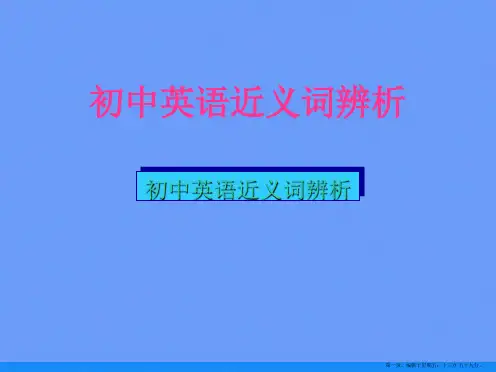
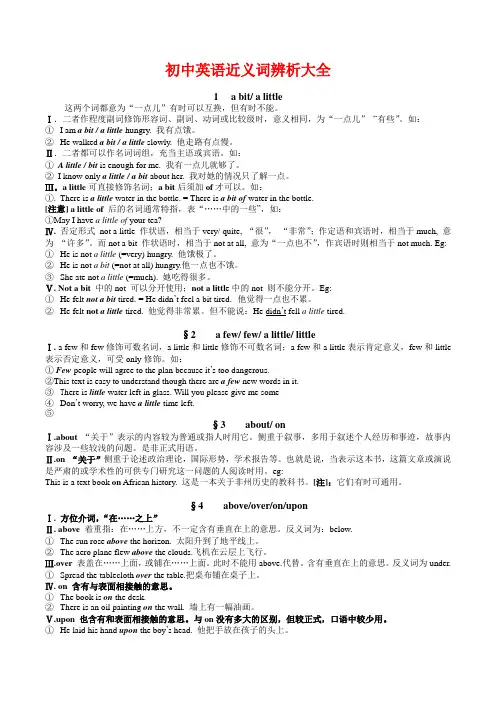
初中英语近义词辨析大全1 a bit/ a little这两个词都意为“一点儿”有时可以互换,但有时不能。
Ⅰ.二者作程度副词修饰形容词、副词、动词或比较级时,意义相同,为“一点儿”“有些”。
如:①I am a bit / a little hungry. 我有点饿。
②He walked a bit / a little slowly. 他走路有点慢。
Ⅱ.二者都可以作名词词组,充当主语或宾语。
如:① A little / bit is enough for me. 我有一点儿就够了。
②I know only a little / a bit about her. 我对她的情况只了解一点。
Ⅲ。
a little可直接修饰名词;a bit后须加of才可以。
如:①.There is a little water in the bottle. = There is a bit of water in the bottle.[注意]a little of后的名词通常特指,表“……中的一些”,如:①May I have a little of your tea?Ⅳ. 否定形式not a little 作状语,相当于very/ quite, “很”,“非常”;作定语和宾语时,相当于much, 意为“许多”。
而not a bit 作状语时,相当于not at all, 意为“一点也不”,作宾语时则相当于not much. Eg:①He is not a little (=very) hungry. 他饿极了。
②He is not a bit (=not at all) hungry.他一点也不饿。
③She ate not a little (=much). 她吃得很多。
Ⅴ. Not a bit中的not 可以分开使用;not a littl e中的not 则不能分开。
Eg:①He felt not a bit tired. = He didn’t feel a bit tired. 他觉得一点也不累。
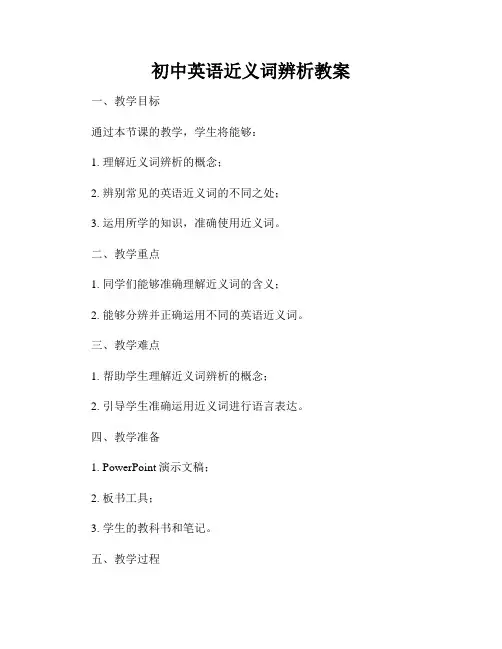
初中英语近义词辨析教案一、教学目标通过本节课的教学,学生将能够:1. 理解近义词辨析的概念;2. 辨别常见的英语近义词的不同之处;3. 运用所学的知识,准确使用近义词。
二、教学重点1. 同学们能够准确理解近义词的含义;2. 能够分辨并正确运用不同的英语近义词。
三、教学难点1. 帮助学生理解近义词辨析的概念;2. 引导学生准确运用近义词进行语言表达。
四、教学准备1. PowerPoint演示文稿;2. 板书工具;3. 学生的教科书和笔记。
五、教学过程Step 1:导入新知(教师用PowerPoint演示近义词辨析的概念和重要性,并展示一些具体的例子)教师:同学们好!今天我们要学习一种非常重要的英语语言技巧——近义词辨析。
首先,我想问一下,你们知道近义词是什么吗?(等待学生回答)对,近义词就是在意思上相近或相似的词语。
这对我们准确表达自己的想法非常重要,因为有时候仅仅使用一个词可能无法完全传达我们的意思。
下面,我将用几个例子来向你们展示这一点。
(教师使用PowerPoint演示,比较不同近义词的用法,例如:big 和large,happy和glad,buy和purchase等)Step 2:近义词辨析的学习和练习(教师使用PowerPoint展示具体的近义词辨析,以及加以解释和例句)教师:现在,我们将学习一些常见的英语近义词以及它们之间的不同之处。
请仔细观察以下表格。
(教师出示样例表格,如下所示)---------------------------------------| 词语A | 词语B |---------------------------------------| ExampleA | ExampleB |---------------------------------------教师:我将使用这个表格来说明两个不同的近义词,例如:“nice”和“kind”。
请听我解释它们之间的异同,并在表格中填写相关的信息。

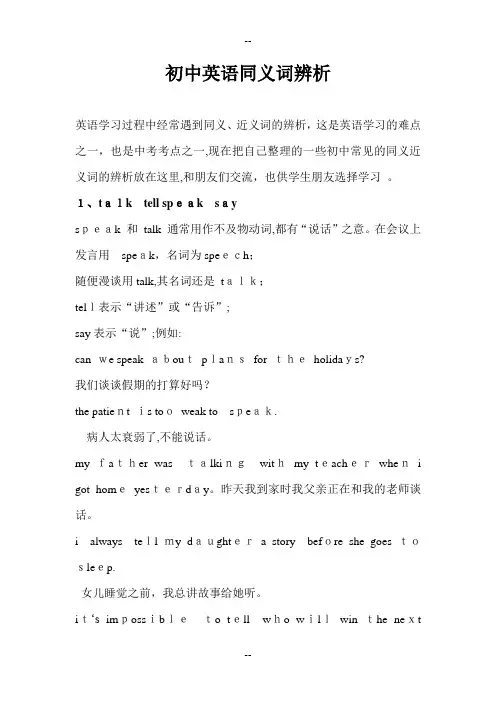
初中英语同义词辨析英语学习过程中经常遇到同义、近义词的辨析,这是英语学习的难点之一,也是中考考点之一,现在把自己整理的一些初中常见的同义近义词的辨析放在这里,和朋友们交流,也供学生朋友选择学习。
1、talk tell speak sayspeak 和talk 通常用作不及物动词,都有“说话”之意。
在会议上发言用speak,名词为speech;随便漫谈用talk,其名词还是talk;tell表示“讲述”或“告诉”;say表示“说”;例如:can we speak aboutplansfor theholidays?我们谈谈假期的打算好吗?the patient is tooweak to speak.病人太衰弱了,不能说话。
my father wastalkingwithmy teacherwheni got homeyesterday。
昨天我到家时我父亲正在和我的老师谈话。
i always tell my daughtera story before she goes tosleep.女儿睡觉之前,我总讲故事给她听。
it‘s impossibleto tell who willwin the nextelection.下届选举谁能获胜无法预知。
she saidnothingtome about it.关于这一点,她什么也没有对我讲。
*speak当及物动词用时,宾语一般是语言或词语之类的词。
如: does anyone speak english here? 这儿有人会说英语吗?2、goodwellnicegood形容词,好的,合适的,新鲜的,擅长的。
well 作形容词时,指"(身体)健康的”;还可用作副词,修饰动词。
nice形容词,美好的,令人愉快的,可爱的,特指取悦感官的事物。
she isgoodatenglish.她擅长英语。
this caketastesgood.这蛋糕好吃。
his mother is very well.他妈妈很健康。
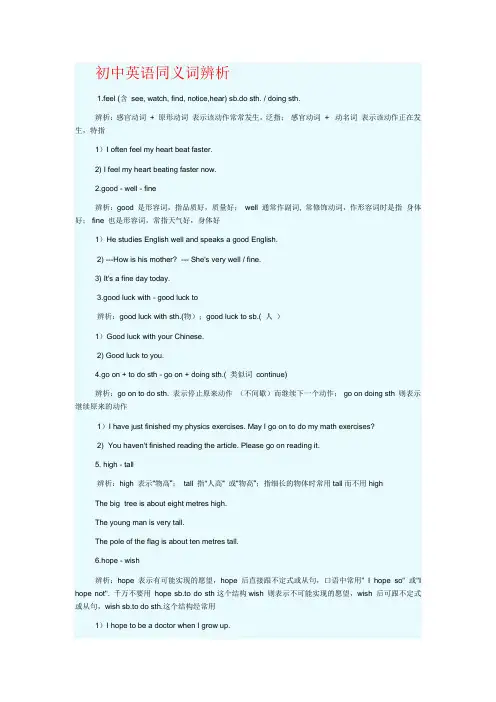
初中英语同义词辨析1.feel (含see, watch, find, notice,hear) sb.do sth. / doing sth.辨析:感官动词+ 原形动词表示该动作常常发生,泛指;感官动词+ 动名词表示该动作正在发生,特指1)I often feel my heart beat faster.2) I feel my heart beating faster now.2.good - well - fine辨析:good 是形容词,指品质好,质量好;well 通常作副词, 常修饰动词,作形容词时是指身体好; fine 也是形容词,常指天气好,身体好1)He studies English well and speaks a good English.2) ---How is his mother? --- She's very well / fine.3) It's a fine day today.3.good luck with - good luck to辨析:good luck with sth.(物);good luck to sb.( 人)1)Good luck with your Chinese.2) Good luck to you.4.go on + to do sth - go on + doing sth.( 类似词continue)辨析:go on to do sth. 表示停止原来动作(不间歇)而继续下一个动作; go on doing sth 则表示继续原来的动作1)I have just finished my physics exercises. May I go on to do my math exercises?2) You haven't finished reading the article. Please go on reading it.5. high - tall辨析:high 表示“物高”;tall 指"人高“ 或“物高”;指细长的物体时常用tall而不用highThe big tree is about eight metres high.The young man is very tall.The pole of the flag is about ten metres tall.6.hope - wish辨析:hope 表示有可能实现的愿望,hope 后直接跟不定式或从句,口语中常用" I hope so" 或"I hope not". 千万不要用hope sb.to do sth这个结构wish 则表示不可能实现的愿望,wish 后可跟不定式或从句,wish sb.to do sth.这个结构经常用1)I hope to be a doctor when I grow up.2) We hope that we all can pass the exam.3)-- Do you want to go with us? --- I hope so.4) He wishes he could fly to the moon some day.5) The teacher wished us to hand in our exercise-books in time.6.have to - must辨析:have to 表示客观需求,“必须”“一定”“不得不”,而must则表示主观愿望1)I had to stay at home to look after my mother because she is ill yesterday.2)He doesn't have to say so .3)You must learn English well.7. hanged - hung辨析:hanged 表示“绞死”“吊死”,hung 表示“悬挂”“吊起来”1)You will be hanged as a spy tommorrow.2) My wet clothes are hung on the line .8. have been - have gone辨析:have been表示“去过某地”,而have gone 则表示“到某地去了”,现不在这里1)I have been to Beijing twice already.2) My head teacher has gone to Nanjing.3) ---- Where is your father? --- He has gone to work.9. hear - listen - listen to辨析:hear 表示“听”的结果,listen to 表示“听”的动作,而listen 则是呼唤词,通常放到句首1)I listened to the teacher , but I heard nothing clearly.2) Please listen to her carefully.3) Listen! Who is crying?10.have/ have got(1)在英语口语中,常用have got 代替have ,作“有”解。
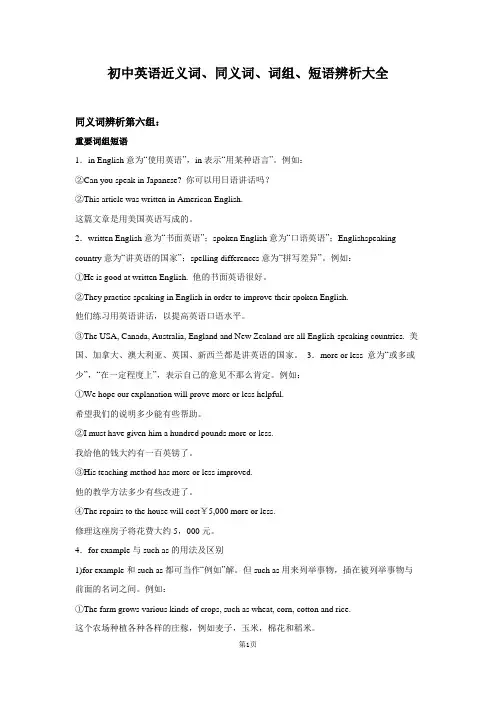
初中英语近义词、同义词、词组、短语辨析大全同义词辨析第六组:重要词组短语1.in English意为“使用英语”,in表示“用某种语言”。
例如:②Can you speak in Japanese? 你可以用日语讲话吗?②This article was written in American English.这篇文章是用美国英语写成的。
2.written English意为“书面英语”;spoken English意为“口语英语”;Englishspeaking country意为“讲英语的国家”;spelling differences意为“拼写差异”。
例如:①He is good at written English. 他的书面英语很好。
②They practise speaking in English in order to improve their spoken English.他们练习用英语讲话,以提高英语口语水平。
③The USA, Canada, Australia, England and New Zealand are all English-speaking countries. 美国、加拿大、澳大利亚、英国、新西兰都是讲英语的国家。
3.more or less 意为“或多或少”,“在一定程度上”,表示自己的意见不那么肯定。
例如:①We hope our explanation will prove more or less helpful.希望我们的说明多少能有些帮助。
②I must have given him a hundred pounds more or less.我给他的钱大约有一百英镑了。
③His teaching method has more or less improved.他的教学方法多少有些改进了。
④The repairs to the house will cost¥5,000 more or less.修理这座房子将花费大约5,000元。
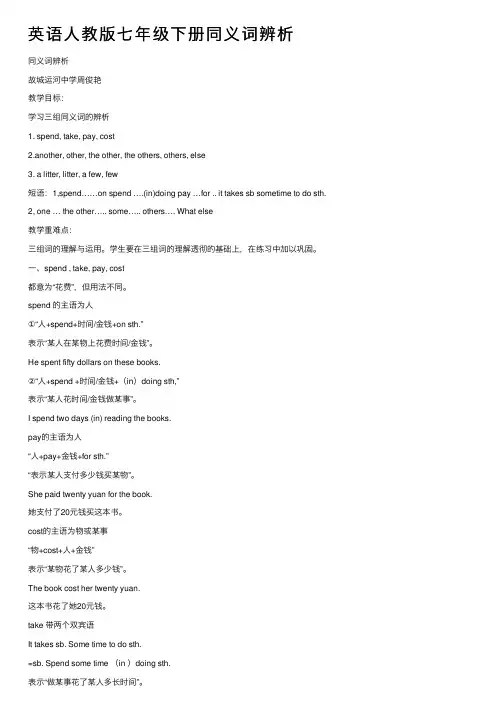
英语⼈教版七年级下册同义词辨析同义词辨析故城运河中学周俊艳教学⽬标:学习三组同义词的辨析1. spend, take, pay, cost2.another, other, the other, the others, others, else3. a litter, litter, a few, few短语:1,spend……on spend ….(in)doing pay …for .. it takes sb sometime to do sth. 2, one … the other….. some….. others…. What else教学重难点:三组词的理解与运⽤。
学⽣要在三组词的理解透彻的基础上,在练习中加以巩固。
⼀、spend , take, pay, cost都意为“花费”,但⽤法不同。
spend 的主语为⼈①“⼈+spend+时间/⾦钱+on sth.”表⽰“某⼈在某物上花费时间/⾦钱”。
He spent fifty dollars on these books.②“⼈+spend +时间/⾦钱+(in)doing sth,”表⽰“某⼈花时间/⾦钱做某事”。
I spend two days (in) reading the books.pay的主语为⼈“⼈+pay+⾦钱+for sth.”“表⽰某⼈⽀付多少钱买某物”。
She paid twenty yuan for the book.她⽀付了20元钱买这本书。
cost的主语为物或某事“物+cost+⼈+⾦钱”表⽰“某物花了某⼈多少钱”。
The book cost her twenty yuan.这本书花了她20元钱。
take 带两个双宾语It takes sb. Some time to do sth.=sb. Spend some time (in )doing sth.表⽰“做某事花了某⼈多长时间”。
It took me seven days to finish the task.=I spend seven days finishing the task.Exercise1.I’m interested in animals, so I ____every Saturday working in an animal hospital.A.pay B cost C take D spend2.They spend too much time____ the report.A. writing B to write C write D on writing3.How much the pen ____ you?A payB costC take Dspend4.Will you please___ for my dinner ,peter?A spendB takeC payD cost5. It will___ me too much time to read this book.A. take B spend C cost D payI spent two hours solving these problems.(同义句)___ ____ _____ two hours ____ ___ these problems.He spends fourteen yuan on the book.(同义句)He ______ fourteen yuan ___ the book.The book _____ him fourteen yuan.⼆、another、other 、others 、the other 、the others 、else 的区分1.another泛指(指三者或三者以上中的)另⼀个,既可作代词⼜可作形容词其后可加可数名词单数,后与数词+可数名词复数连⽤。
初中英语183个同义词辨析详细解析translation,version,paraphrase这些名词均含“翻译,译文”之意。
translation:普通用词,指从一种语言到另一种语言的翻译。
version可与translation换用,尤指不拘泥于文字的意译,更常指某种作品的一种译文。
paraphrase:可指非常自由的解释,不拘泥遣词造句,重在传意。
通常指用同样语言深入浅出地解释艰深的句子或段落。
transparent,clear这两个形容词均可表示“透明的”之意。
transparent:指某物完全透明状态,通过它能清楚看到其它东西。
clear:指视力不受阻碍,强调清晰透澈。
trial,experiment,test,try这些名词均有“试验”之意。
trial:指为观察、研究某事物以区别其真伪、优劣或效果等而进行较长时间的试验或试用过程。
experiment:多指用科学方法在实验室内进行较系统的操作实验以验证、解释或说明某一理论、定理或某一观点等。
test:普通用词,含义广,指用科学方法对某物质进行测试以估价其性质或效能等。
try:普通用词,多用于口语或非正式场合,指试一试。
trend,tendency,current这些名词均含“趋势,倾向”之意。
trend:指事物发展总的方向、倾向或趋势。
tendency:指固有或习得的倾向性,强调没有外来的影响或干扰。
current:指向某一方面发展或在确趋向中行动。
trumpet,bugle这两个名词均有“喇叭,小号”之意。
trumpet:泛指一般由黄铜做的喇叭,不拘大小而言。
bugle:一般指军队中吹信号用的小喇叭。
turbulent,stormy,violent,wild,fierce这些形容词均含“剧烈的,凶猛的,狂暴的”之意。
turbulent:正式用词,多用描写风和水,也可指心神不定或控制不住的感情波动。
stormy:指风雨大作,也指人很激动的感情。
初中三年英语必备同义词辨析(附超详细讲解例句)中考常考同义词辨析1.say, speak, talk, tell这四个词都有“说”的意思,其用法差异主要在于各自强调的对象、内容不同。
(1) say的意思是“说”、“讲”、“说出”,是及物动词,强调“说”的内容。
不仅可指口头“说”,而且可指书面“说”。
eg: ① He said nothing to me. 他对我什么也没说。
② He said in his letter that he was getting on well with his life.他在信中说,他生活得很好。
(2) speak表“说”、“讲”,它可以表示任何一种方式的“说话”。
它着重“说话”这一动作本身,而不强调所“说”的内容。
它通常为不及物动词,但它也可以作及物动词,后接the language、the truth、aword等,或接表示语言名称的名词。
eg: ①Please speak more slowly and clearly. 请说慢些和清楚些。
②Who is speaking? 你是谁?(打电话时用语)③Can you speak Japanese? 你会讲日语吗?(3) talk表示“交谈”、“谈话”,它指连贯地与人交谈,着重指说话的动作,而不强调说话的内容。
它一般用作不及物动词。
eg: ①What are you talking about? 你们在谈论什么?②We are talking about the Chinese footballmatch.我们在谈论中国足球比赛。
(4) tell表“告诉”、“讲述”之意,是及物动词,常强调所讲的内容,不表示动作。
重点句式:tell sb. sth = tell sth to sb. 告诉某人某事eg: He told me nothing. = He toldnothing to me.他什么也没告诉我。
tell sb. (not) to do sth. 告诉某人(不)去做某事eg: He told us not to worry abouthim.他告诉我们不要为他担心。
八年级词类辨析1. tell, talk, say, speak(1)tell 告诉,讲述tell sb. sth.=tell sth. to sb. 告诉某人某事(2)talk 交谈talk to/with sb.和某人交谈talk about sth. 谈论某事(3)say 说,强调说的内容say hello to sb. 向某人问好(4)speak 说某种语言练习 1:1.Can you me the truth?2.What language do you ?3.This is what they yesterday.4.Don’t in class,please be quiet.2. look, look at, see, watch(1)look 看起来 look+形容词(2)look at 朝…看强调看的动作(3)see 看见强调看的结果(4)watch 观看尤其指看电视,看球赛等练习2:1.The coat nice, I want to buy one for my daughter.2.Please the blackboard, can you anything?3.She doesn’t like TV, but she likes football game.3. sound,listen to, hear(1)sound 听起来sound+形容词(2)listen to 听强调听的动作(3)hear 听见强调听的结果练习3:1.the radio, it says the flood is coming soon.2.I can’t you , because there’s something wrong with my ears.3.What you said interesting.4.receive, accept(1)receive 收到强调客观接受(2)accept 接受,收下强调主观接受She received his letter but she can’t accepted his love.练习 4:He a present yesterday, but he didn’t it, because it was too expensive.5.look up, look for, find, find out(1)look up 查词典、书、电话簿等,代词放中间look it up(2)look for 寻找强调找的动作(3)find 找到强调找的结果(4)find out 发现结果指经过努力而发现的结论练习5:1.He often takes a dictionary and the new words in it?2.The little girl her pen everywhere but didn’t it at last.3.Look! Lucy is crying over there. Let’s go and why is she crying.6. keep, borrow, lend(1)keep 借可以保留一段时间(2)borrow 借强调将东西接进来borrow...from 从........... 借来(3)lend 借强调将东西借出去lend...to 借给练习6:1.---My bike is broken, can I yours ,Lily?---Oh, sorry, I’ve it to Sandy.2.You can my recorder for three days.3.We often books from our school library.4.He often money to his brother.7. reach, arrive, get(1)reach 到达,够得着是个及物动词(2)arrive 到达不及物动词arrive in+大地点arrive at+小地点(3)get 到达不及物动词get to 到达练习 7:1.They will in Chengdu next week.2.How do you to school every day?e a longer stick, then you can the apples.8. thanks to, thanks for(1)thank to 幸亏,由于(2)thanks for 因…谢谢练习 8:1.your help, I’ve understand it.2.the cats, mice dare not come and eat my food.9. give in, give up(1)give in 投降(2)give up 放弃give up doing sth. 放弃做某事练习9:1.We shouldn’t learning English!2.I would rather die than before my enemies.10. achieve, come true(1)achieve 实现(理想、愿望、预言等)及物动词,主语一般为人(2)come true 实现不及物动词组,主语为梦想,理想练习10:1.He works so hard that he is sure to his dream.2.His prediction of human’s flying to the moon.11. turn off, close, turn on, open(1)turn off 关(电器)turn on 开(电器)(2)close 关(门、窗、书等)open 开(门、窗、书等)练习11:1.the windows please, it’s so cold outside.2.the lights before you leave the room.3.The dog the box and took the bone out!4.the TV, I want to watch the NBA basketball games.12.break off, break out, break into, break down(1)break off 中断关系,突然终止(2)break out 指战争爆发(3)break into 非法进入或闯入(4)break down 坏掉,(车、船等)抛锚,中途不工作练习 12:1 He was late for school yesterday, because his car on the half way.2 The World WarⅡwhen she was only five.3 They their friendship and didn’t talk to each other any more.4 Last night a thief my house and took away my TV.13.reply, answer, solve(1)reply 回复,答复不及物动词reply to sb.(2)answer 回答,答案及物动词answer question(3)solve 解决,处理及物动词 solve problem练习13:1.What did Mr. Smith to what others said?2.No one in our class can this question.3.It’s too difficult for everyone to that problem.4.She failed to my question.5.We haven’t to his letter yet.6.None of us knew the to the problem.14. hope, wish(1)hope 希望,指较为现实的想法hope to do 或hope + 从句,但没有hope sb to do(2)wish 希望,指不太现实的要求或想法 wish to do 或 wish sb to do练习 14:1. ---The weather may be fine tomorrow.---I so.3.Mum me to be a doctor in the future.4.How I I could fly to the moon!15. take, cost, spend, pay(1)take 花费, 尤指花费时间,主语为物it takes sb. some time to do sth.(2)cost 花费, 指花金钱,主语为物sth. cost sb. some money(3)spend 花费, 主语为人spend...(in) doing 或 spend...on sth.(4)pay 花费, 主语为人pay for练习 15:1.It often about 3 hours to get to school from my home.2.---Who will for the bill?---Maybe our boss.3.The house him 30,000 dollars.4.His cousin the whole day making the toy car yesterday.16. take part in, join, attend(1)take part in 参加某项活动(2)join 指参加某组织,成为其中的一个成员(3)attend 指参加会议,婚礼,葬礼,典礼;去上课,上学,听报告等练习 16:1.Mr. Wang the Party 5 years ago.2.They invited Lily the English evening.3.He’ll an important meeting tomorrow.17. do with, deal with(1)do with 处理,应付在问句中要与what 连用(2)deal with 处理,对付在问句中要与 how 连用练习 17:1.How can you that problem?2.What do you the event?18. put on, wear, dress, in(1)put on 穿上强调穿衣的动作(2)wear 穿着强调穿的状态,是一个延续性动词(3)dress 给…穿衣服宾语为人dress oneself 给某人自己穿衣服(4)in 穿着强调穿戴的状态be in+颜色练习18:1.the warm clothes, it’s cold outside.2.Mary is always red clothes . Maybe red is her favorite color.3.The little boy could himself when he was three years old.4.The old man a pair of glasses.19. win, beat,defeat(1)win 赢得一般指赢得比赛,奖品或战斗,宾语为物(2)beat 战胜,打败一般指打败参加比赛或游戏的人或团体,宾语为人(3)d efeat 战胜,打败一般指战场上打败敌人,宾语为人练习19:1.Our team has the football match, we are all happy.2.The Brazilian football team us 5-0 in that match, all the Chinese fans were verysad.3.The army the enemy at last.20. be made in, be made of, be made from, be made up of(1)be made in 在哪里制作,后面接产地(2)be made of 由…制成,看得出原料(3)be made from 由…制成,看不出原料(4)be made up of 由…组成,强调由个体组成整体练习 20:1.The desk wood.2.This kind of watch Shanghai.3.Our class 50 students.4.Paper bamboo.21. have been to, have gone to(1)have been to 曾经去过(现在在说话地),可与次数连用(2)have gone to 已经去了(现在不在说话地)练习 21:1.They Italy for more than 7 years, so Italy is their second home.2.---How many times Hainan?---Only 3 times.22. too much, much too, too many, many too(1)too much 太多too much+不可数名词(2)much too 太...... much too+形容词(3)toomany 太多too many+可数名词复数(4)many too 用法不存在练习 22:1.The computer is expensive.2.Stop, Peter. You talked .3.Don’t eat apples every day.4.Father, have a rest. You’ve tired today.5.Hurry up! You have wasted time.23. many, much , lots of , a lot ( of )(1)many 许多many+可数名词复数(2)much 许多much+不可数名词(3)a lot of/lots of 许多 a lot of/lots of+可数名词复数/不可数名词(4)a lot 很,非常 a lot 修饰动词练习 23:1.of the visitors are workers.2.Has Jack have money?3.During those three weeks, he ate meat.4.I did not understand why you had so strange questions.5.Although he is a boy, he reads .24. above all, after all, first of all, at all, in all(1)above all 最重要的是, 尤其是,强调要引起特别注意(2)after all 毕竟, 终究(3)first of all 首先, 强调次序(4)at all 根本,丝毫否定+at all(5)i n all 总共, 总计练习 25:1.Never waste anything, but never waste time.2., let me introduce myself to you.3.There are 35 students in our class.4.He is still a child . Don’t blame him.5.I don’t know him.26. passed, past(1)passed 经过动词pass 的过去式或过去分词(2)past 经过介词或副词练习 26:1.They hurried the building.2.Tom by me without greeting just now.3.The train for the small town leaves at ten eight.4.Two weeks had since Martin had seen him.5.In the , I have had many jobs.27. agree to, agree with, agree on(1)agree to 表示一方提出一项建议、安排、计划等,另一方同意协作(2)agree with 表示同意某人或某人的意见、想法、分析、解释等;(气候、食物等)“适合”的意思。
初中英语知识归纳近义词的用法和区别近义词是指在词义上或者语法用法上有一定相似度的词语。
在学习英语时,了解近义词的用法和区别对于提高语言表达的准确性和丰富性非常重要。
本文将对初中英语知识中常见的近义词进行归纳总结,并详细探讨它们的用法和区别。
1. ask / inquire"ask" 和 "inquire" 都表示“询问”的意思,但在用法上略有区别。
"ask" 是常用词,可以用于正式和非正式场合,一般用于对他人提出问题或请求信息。
例如:- She asked me about my favorite movie.(她问起我最喜欢的电影。
)- Can I ask you a question?(我可以问你个问题吗?)"inquire" 则更加正式和严肃,一般用于正式或商务场合。
例如:- He inquired about the price of the car.(他询问了一下汽车的价格。
)- The police are inquiring into the matter.(警方正在调查这件事。
)总结:"ask" 是更常用的词,适用于各种场合;"inquire" 则更正式,适用于商务或正式场合。
2. buy / purchase"buy" 和 "purchase" 都表示“购买”的意思,可以互相替换使用。
但从程度上来说,"purchase" 更正式,常用于商务或正式文书中。
例如:- She bought a new dress at the mall.(她在商场买了一条新裙子。
)- We purchased some office supplies for the company.(我们为公司购买了一些办公用品。
)总结:"buy" 更常用,可以适用于日常口语和非正式场合;"purchase" 更正式,适用于商务或正式写作。
1 a bit/ a little这两个词都意为“一点儿”有时可以互换,但有时不能。
Ⅰ.二者作程度副词修饰形容词、副词、动词或比较级时,意义相同,为“一点儿”“有些”。
如:①I am a bit / a little hungry. 我有点饿。
②He walked a bit / a little slowly. 他走路有点慢。
Ⅱ.二者都可以作名词词组,充当主语或宾语。
如:① A little / bit is enough for me. 我有一点儿就够了。
②I know only a little / a bit about her. 我对她的情况只了解一点。
Ⅲ。
a little可直接修饰名词;a bit后须加of才可以。
如:①.There is a little water in the bottle. = There is a bit of water in the bottle.[注意]a little of后的名词通常特指,表“……中的一些”,如:①May I have a little of your tea?Ⅳ. 否定形式not a little 作状语,相当于very/ quite, “很”,“非常”;作定语和宾语时,相当于much, 意为“许多”。
而not a bit 作状语时,相当于not at all, 意为“一点也不”,作宾语时则相当于not much. Eg:①He is not a little (=very) hungry. 他饿极了。
②He is not a bit (=not at all) hungry.他一点也不饿。
③She ate not a little (=much). 她吃得很多。
Ⅴ. Not a bit中的not 可以分开使用;not a littl e中的not 则不能分开。
Eg:①He felt not a bit tired. = He didn’t feel a bit tired. 他觉得一点也不累。
②He felt not a little tired. 他觉得非常累。
但不能说:He didn’t fell a little tired.§2 a few/ few/ a little/ littleⅠ. a few和few修饰可数名词,a little和little修饰不可数名词;a few和a little表示肯定意义,few和little 表示否定意义,可受only修饰。
如:①Few people will agree to the plan because it’s too dangerous.②This text is easy to understand though there are a few new words in it.③T here is little water left in glass. Will you please give me some④Don’t worry, we have a little time left.⑤§3about/ onⅠ.about “关于”表示的内容较为普通或指人时用它。
侧重于叙事,多用于叙述个人经历和事迹,故事内容涉及一些较浅的问题。
是非正式用语。
Ⅱ.on “关于”侧重于论述政治理论,国际形势,学术报告等。
也就是说,当表示这本书,这篇文章或演说是严肃的或学术性的可供专门研究这一问题的人阅读时用。
eg:This is a text book on African history. 这是一本关于非州历史的教科书。
[注]:它们有时可通用。
§4above/over/on/uponⅠ. 方位介词,“在……之上”Ⅱ. above 着重指:在……上方,不一定含有垂直在上的意思。
反义词为:below.①The sun rose above the horizon. 太阳升到了地平线上。
②The aero plane flew above the clouds.飞机在云层上飞行。
Ⅲ.over 表盖在……上面,或铺在……上面。
此时不能用above.代替。
含有垂直在上的意思。
反义词为under.①Spread the tablecloth over the table.把桌布铺在桌子上。
Ⅳ. on 含有与表面相接触的意思。
①The book is on the desk.②There is an oil painting on the wall. 墙上有一幅油画。
Ⅴ.upon 也含有和表面相接触的意思。
与on没有多大的区别,但较正式,口语中较少用。
①He laid his hand upon the boy’s head. 他把手放在孩子的头上。
[注]up 与以上几个不同,它表示向上方或高处,含有由下而上,由低而高的意思。
常和表示运动的动词连用。
作副词时,表示在上方或高处。
①We run up a hill. 我们跑上山。
②The plane was high up in the air.飞机在高空中。
§5accident/incident “事故”Ⅰ. accident 可以表示事故,指不幸的意外事件。
也表偶然的事件。
①Twenty people were killed in the railway accident②He met with an accident.这完全是偶然的事。
Ⅱ. Incident 的意思是事件,尤指与较重大的事件相比,显得不重要的事件。
它还可以表引起国际争端或战争的事件。
①It is a quite common incident.这是很普通的事。
②The Lugouqiao incident accrued on July 7th, 1937. 芦沟桥事件发生于1937年7月7日。
§6accept/receiveⅠ. accept “接受”,表示其行为是由主观意愿决定的。
①I accepted it without question. 我毫无疑问地接受了它。
②We have accepted his proposal. 我已接受了他的建议。
Ⅱ. receive “接到、收到、受到”表示其行为与主观意愿无关。
如:①I received a letter from him. 我收到了他的来信。
②He received the present, but he did not accept. 他收到了礼物,但没有接受下来。
③He received a good education.他受到了良好的教育。
[注] 在表示接待、接见时,通常用receive, 而不用accept.如:We often receive foreign guests. 我们经常接待外宾。
§7 at hand/ in handⅠ. at hand“在手边;在附近;即将到来”如:①When he writes, he always keeps a dictionary at hand.他写东西时,手边总有一本字典。
②Spring is at hand.春天就要来了。
Ⅱ. in hand “在手中的;现有的”引申为:“在掌握中;在处理中”。
如:①I have 100 yuan in hand.我手头有100元钱。
②The police immediately had the situation in hand.警方立即控制了局势。
§8accurate/exact/correctⅠ. accurate “准确、精确”不仅表无错误,且表细心,谨慎地做到符合标准,符合事实或真象。
如:①Clocks in railway stations must be accurate. 火车站的钟必须准确。
②The figures are not accurate.这些数字不精确。
Ⅱ. exact “精确、确切”强调完全符合标准,符合事实或真象,丝毫没有差错。
它这三个中语意最强。
如:①His translation is exact to the letter. 他的翻译翻译确切。
②Your description is not very exact.你的描述不很确切。
Ⅲ.correct. “正确”指按照一定的标准或规则,而没有错误。
在这有一个词中,它的语意最弱。
①His answer is correct. 他的回答是正确的。
②The thing turned out to be correct.事情结果是对的。
§9ache/pain “痛”Ⅰ. ache 通常指一种持续的隐痛。
它可以与表身体某部分的词,组成复合词。
如:①Where is the ache? 哪里痛?②I have a head ache (stomachache, toothache atc).Ⅱ. pain是普通用语。
不含持续痛的意味,尤指一种突然的剧痛。
除指肉体上的外,还指精神的痛苦。
如:①I feel a great deal of pain.我感到非常痛。
②He cried with pain. 他痛得直叫。
③I have a pain in the arm. 我手臂痛。
④I have pains all over. 我浑身痛。
⑤It gave us much pain to learn of the sad news. 听到不幸的消息很悲痛。
§10across/through/ overⅠ. across “横过、穿过”,指从……的一边到另一边。
含义与on有关。
如:①I swam across the river. 我游过这条河(指从此岸到彼岸)②Let’s help push the cart across the bridge. 我们帮着把车子推过桥吧。
Ⅱ. through “穿过、通过”指穿过两边。
是从空间较狭窄的一头穿到另一头。
是从内部穿过,含义与in有关。
如:①We walked through the forest. 我们穿过森林。
②The river flows through the city from west to east. 这条河从西到东流过城市。
Ⅲ. over“横过、跨越”指横过道路、河流等“细长物”时,与across通用。
Over 虽可指从表面的接触及跳(飞)越,但指渡过则不能用。
从房间、原野、海洋等“平面延伸”的一端横越到另一端时也不能使用。
而常用across.①She went across / over the bridge.②He jumped across / over the stream他跳过了小溪。